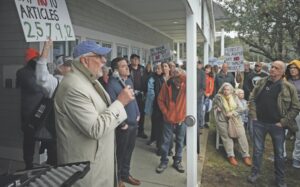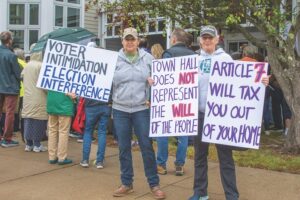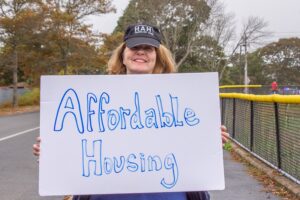TRURO — Challenges to dozens of voter registrations led town officials to delay the special town meeting scheduled for Oct. 21. The meeting, which was to consider both the Walsh property development plan and a new DPW facility, is now set for 5:30 p.m. on Thursday, Nov. 2. It may be put off further because of the large number of voter challenges.

Raphael Richter of Truro submitted 66 of the 67 complaints received by the town clerk last week in sworn affidavits.
Richter said that emails from the Truro Part-Time Resident Taxpayers Association (TPRTA) prompted him to review the voter rolls, where he noticed a “significant change in the typical voting registration patterns.”
Between July 1, when the TPRTA launched a voter registration effort, and Oct. 11, the deadline to register for town meeting, 119 new voters were added.
Of the 66 voters challenged by Richter, 14 claim a residential tax exemption (RTE) in another town, the Independent found. Thirty-three are registered Democrats, 31 are unenrolled, one is a Republican, and one a Libertarian. Each challenge lists at least three pieces of potential evidence of nonresidence, including not appearing on the Truro street listing, not paying a vehicle excise tax here, and registering with an out-of-town mailing address.
At a meeting on Oct. 18, the newly reconstituted board of registrars convened to determine whether there were “sufficient grounds to move forward,” said Town Counsel Lauren Goldberg, the managing attorney of KP Law, at the meeting. Although the burden of proof rests on the challenger, Goldberg said, that person “does not need to prove whether any person lives or doesn’t live in town.” Based on those standards, the registrars determined that 66 of the challenges were substantive enough to call for a hearing.
A 67th complaint will also be reviewed. Filed by former Town Moderator Monica Kraft, it challenges the registration of Anne Greenbaum, vice chair of the planning board. Greenbaum has been a voter in Truro since January 2017, according to the voter rolls, and claims the RTE for her home in Boston. If removed as a voter, Greenbaum would no longer be eligible to serve on the planning board under select board policy #13.
Greenbaum told the Independent she “absolutely” plans to go through with a hearing. “This is where I do all of my volunteer work, civic work,” she said. She added that she plans to sell her house in Boston.
The town sent a letter stating residency requirements for voting to all challenged registrants on Oct. 20, said Town Manager Darrin Tangeman. He said Monday that the town would issue summonses for hearings this week. Voters will be examined under oath at the hearings.
According to David Sullivan, an elections law attorney who drafted the state’s Residency for Voting Purposes manual, “a key factor is how much time you spend sleeping and eating in the community. It’s not decisive, but it’s very important.”
The law states, “If a voter fails to appear at the hearing and the complainant produces enough evidence to show the registrars that the voter should not be registered, the voter’s name shall be removed from the list of voters.” The hearing must be reopened if the voter appears before the next election.
Updated Voter Rolls
Richter said he believed many people changed their registrations based on inaccurate information. He hoped they would “contact the clerk and remove themselves prior to a hearing. Obviously, it is unacceptable to dilute the vote of actual residents by improperly registering to vote in a place you do not in fact live.”
Six of the 67 challenged voters were no longer registered in Truro as of an updated list on Monday, Oct. 23. One of the six, Kingsley Weihe, said she switched her registration back to Boston last week after reading articles in the Independent and the Cape Cod Times.
She registered in Truro after receiving misinformation from the TPRTA. “The person who suggested that I should do it said it’s completely legal,” Weihe said. “It felt a little fishy to me. I finally did it because I’m very concerned about the shortage of affordable housing.”
Terry Rothchild of Newton, who is also no longer registered in Truro, said, “Our family has had a home in Truro for almost 50 years. We feel like no one has the right to not let us vote on something when we pay such high property taxes.”
Terry’s husband, Joseph Rothchild, remains registered in Truro. He said he plans to go through with the registrars’ hearing. The couple are members of the TPRTA, though they said they registered in Truro of their own volition.
In an email to the Independent, the TPRTA Executive Committee wrote, “We share the ever-deepening concerns expressed by 125+ Truro citizens on October 21st that the Town of Truro is apparently engaged in voter suppression and intimidation of all voters, not just new voters.”
The TPRTA would not disclose who the executive committee members are.
Protest in Response
Town officials gathered outside the Truro Central School on Saturday, Oct. 21 to announce the continued date for the special town meeting. A crowd of about 75 was there, with several people carrying signs of protest.

Many had been summoned by Take Back Truro, a self-proclaimed “citizens’ movement focused on keeping Truro rural” and on town projects “at a scale Truro needs and taxpayers can afford.” The group sent an email on Oct. 20 planning the “Rally for Truro” to coincide with the postponed town meeting. The group’s newsletter is compiled by Jon Slater and Mike Janoplis.
Town officials were aware of the group’s plan, and there was police detail onsite.
Town Moderator Paul Wisotzky exercised his legal authority to unilaterally continue the town meeting for up to 14 days to give the registrars time to consider the voter challenges.
As Wisotzky spoke, and as Town Counsel John Giorgio answered questions, the crowd jeered and heckled them, periodically drowning out the speakers.
“Please give me the courtesy of listening to me,” Wisotzky said repeatedly.
The crowd interrupted, booing, calling on officials to “resign,” and yelling, “You don’t deserve our respect!”
One protestor disputed Wisotzky’s reason for delaying the meeting under state law.
In a memo to the moderator dated Oct. 20, attorney Goldberg argued that the voter challenges did fall under the law’s rationale. “Should persons not entitled to vote participate in Town Meeting, in my opinion, the Moderator can properly conclude that votes of all properly registered voters of the Town will be diluted, thereby excluding them from participation,” Goldberg wrote.
Mike Fee, an attorney, Truro resident, and former town moderator in Sudbury, said he “absolutely believes” the postponement falls within Wisotzky’s discretion under this clause. Most statutes stipulating powers of the moderator “are general in nature because they can’t address every possible scenario,” Fee said.
This section’s “intent and purpose is that if the moderator feels for any reason that there’s a circumstance that would cause the integrity of the proceedings to be questioned, then they have the right and the obligation to postpone it until those circumstances are corrected,” said Fee.
The Town’s Response
Town officials posted a message on social media on Oct. 23 about the “lack of civility and disruptive conduct” at Saturday’s gathering. “Regrettably, a few individuals started to disrupt the proceedings by heckling and using offensive language towards both the Town Moderator and Town Counsel,” the post said. “Additionally, there were anti-veteran remarks directed at the Town Manager, along with threats aimed at our Town’s elected officials.”

Select board chair Kristen Reed filed a police report after the event because one attendee repeatedly told her he knew where she lived. “While I acknowledge that this information is publicly available, it is entirely unacceptable to use it as a means of threat or retaliation,” Reed said. “Every resident of Truro should feel safe, regardless of their personal opinions, political positions, or voting preferences.”
“I completely understand that people want to be understood; we all do,” Wisotzky told the Independent on Monday. “But when people shout, heckle, interrupt, and prevent others from speaking, it shuts people down and it pushes people away. If that kind of behavior happens at town meeting, I will not allow it.”
Under Mass. General Law Chapter 39, Section 17, “If a person, after warning from the moderator, persists in disorderly behavior, the moderator may order him to withdraw from the meeting, and, if he does not withdraw, may order a constable or any other person to remove him and confine him in some convenient place until the meeting is adjourned.”
Wisotzky said he thought most of Saturday’s crowd came to listen and learn. “It was a small group of people who were extremely disruptive and disrespectful,” he said, “and it was unnecessary.”
Wisotzky said he chose to continue town meeting on advice from town counsel, the state Elections Division, and the town clerk. “I didn’t make this decision in a vacuum,” he said.
Tangeman said that “to ensure the integrity of town meeting and the vote,” the town will wait to hold town meeting until every challenge is resolved. He cited town election last May, when a one-vote margin at the ballot box led to an official recount that determined a three-vote difference.
“Even one vote can determine the outcome of something,” Tangeman said, “so it’s important that every challenge has been resolved before we have town meeting.”
